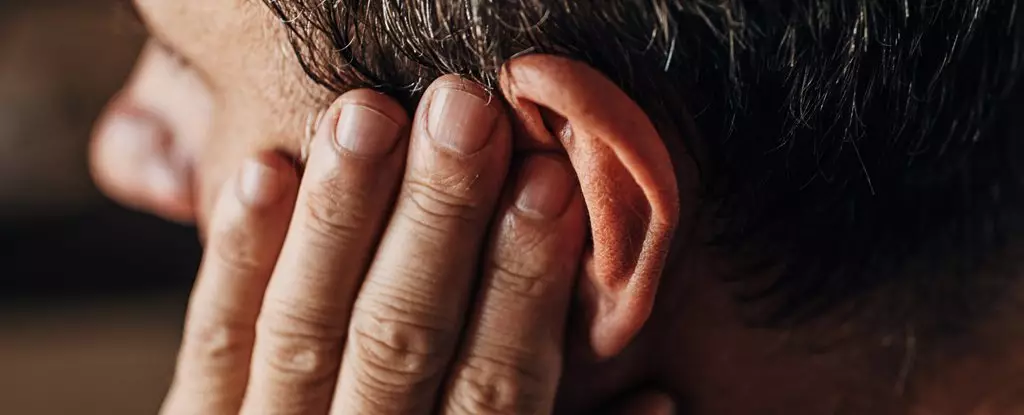Tinnitus, a condition plaguing around 15% of the global population, often manifests as a persistent ringing or buzzing sound devoid of any external auditory source. For many, this is more than just an irritant; it represents a formidable challenge that can lead to severe mental health issues including anxiety, stress, and depression. This psychological toll is particularly pronounced for those who live with tinnitus over prolonged periods, sometimes lasting years. As it stands, no definitive cure exists, making the search for effective management strategies both urgent and necessary for millions struggling worldwide.
In exploring potential therapeutic avenues, recent studies have started to illuminate a surprising ally in combatting tinnitus: sleep. Given the relationship between the auditory pathways and brain functions that govern sleep cycles, understanding this interplay could provide new hope for those affected.
The Brain’s Mystery: Phantom Sounds and Alternate Realities
Tinnitus is classified as a phantom perception, wherein the brain’s activity conjures sounds that do not exist externally. While typically, such perceptions occur during sleep, individuals with tinnitus often experience them while awake. This raises critical questions about the underlying neural mechanisms, particularly how certain brain regions appear to become hyperactive.
New research has focused on the neural changes brought about by sleep and tinnitus, suggesting that better insights into these mechanisms may lead to innovative treatments. Similar neural pathways activated during wakefulness and sleep are implicated, which paves the way for a potential understanding of how sleep may offer ways to mitigate tinnitus symptoms.
Sleep Stages: A Complex Dance of Restoration
Understanding the different stages of sleep—particularly slow-wave sleep (SWS)—is essential. This phase is noted for its restorative properties, enabling the brain to recover and replenish its resources. It is during this slow-wave period that patterns of brain activity shift dramatically, allowing for the activation of areas responsible for memory consolidation and sensory processing.
However, in tinnitus sufferers, some areas may remain abnormally active during sleep, similar to phenomena observed in sleep disturbances such as sleepwalking. This persistent activity can lead to increased sleep disruption, which exacerbates the struggle of those individuals, resulting in lighter sleep compared to non-sufferers. The insight that tinnitus may obstruct the brain’s ability to generate sufficient slow-wave sleep is both troubling and illuminating.
The Dual Role of Deep Sleep
Interestingly, the research indicates that while tinnitus patients often experience less deep sleep, some aspects of this restorative state seem minimally impacted. This inconsistency suggests that during the deepest stages of sleep, certain brain activities may actually suppress the perception of tinnitus. The very neurons that drive the brain into slow-wave activity are integral to managing the condition, as they are capable of influencing regions of the brain responsible for the sound perception associated with tinnitus.
In essence, deep sleep might function as a natural suppressor to the intrusive sounds of tinnitus, providing a sliver of hope that optimizing sleep could yield tangible benefits.
Exploring Remedies through the Lens of Sleep
The relationship between sleep and tinnitus underscores the importance of investigating sleep quality as a pivotal aspect of treatment. By narrowing down specific sleep manipulations, such as sleep restriction techniques—where patients are encouraged to sleep only when genuinely fatigued—researchers believe they could enhance deep sleep phases and, in turn, reduce tinnitus symptoms.
Moreover, considering the diverse stages of sleep, including the rapidly oscillating REM stage, provides fertile ground for further exploration. Each sleep stage exhibits unique patterns and activities that could reveal additional insights into tinnitus management.
One promising approach involves monitoring brain activity during sleep to gain deeper insights into how different stages affect tinnitus. This dual-tracking could yield a nuanced understanding, allowing for targeted interventions that might lessen the condition’s hold on individuals.
The Road Ahead: Tinnitus and Sleep as Interlinked Challenges
The intersection of sleep and tinnitus presents a fertile landscape for ongoing research and innovation. As understanding deepens, it may pave the way for preventive strategies and new therapeutic options that not only address the bothersome sounds of tinnitus but also enhance overall sleep quality.
In considering this relationship, it’s crucial to advocate for heightened awareness of sleep’s vital role in managing chronic conditions like tinnitus. By illuminating these connections, there is potential not only to relieve suffering but to transform lives, offering those affected a better life enhanced by deeper, more restorative sleep.

